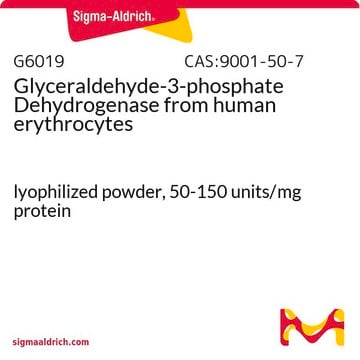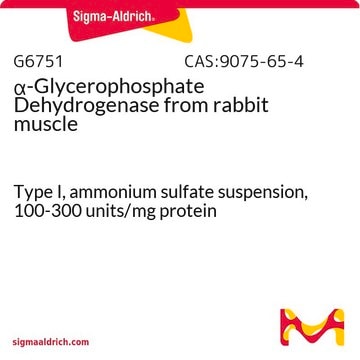39705
D-Glyceraldehyde 3-phosphate solution
8-13 mg/mL in H2O
Synonym(s):
(2R)-2-Hydroxy-3-phosphonooxypropanal, D-GAP, Triose phosphate
Sign Into View Organizational & Contract Pricing
All Photos(1)
About This Item
Empirical Formula (Hill Notation):
C3H7O6P
CAS Number:
Molecular Weight:
170.06
Beilstein:
1725007
MDL number:
UNSPSC Code:
12352201
PubChem Substance ID:
NACRES:
NA.25
Recommended Products
Assay
≥97.0% (TLC)
Quality Level
form
solution
concentration
8-13 mg/mL in H2O
color
colorless
storage temp.
−20°C
SMILES string
O[C@H](COP(O)(O)=O)C=O
InChI
1S/C3H7O6P/c4-1-3(5)2-9-10(6,7)8/h1,3,5H,2H2,(H2,6,7,8)/t3-/m0/s1
InChI key
LXJXRIRHZLFYRP-VKHMYHEASA-N
Application
- Enzymatic Assay Development with d-Glyceraldehyde 3-Phosphate: Demonstrated as a crucial reagent in enzymatic assays involving glycolysis pathways, specifically in the assessment of glyceraldehyde 3-phosphate dehydrogenase activities, which play a vital role in understanding cellular energy production and metabolic disorders (Li et al., 2022).
Biochem/physiol Actions
An important substance implicated in energy metabolism. It is a key node point linking other metabolic processes or pathways. Triosephosphate metabolism can be associated with many metabolic pathways, including glycolysis, pentose phosphate pathway, gluconeogenesis and lipid metabolism, and can also be involved in maintaining hemostasis. The metabolic abnormality of triosephosphate may be tied to many pathophysiological processes, such as triosephosphate isomerase deficiency, hyperglycemia and diabetic nephropathy; review and papers cited therein.
Other Notes
To gain a comprehensive understanding of our extensive range of Monosaccharides for your research, we encourage you to visit our Carbohydrates Category page.
Storage Class Code
10 - Combustible liquids
WGK
WGK 1
Flash Point(F)
Not applicable
Flash Point(C)
Not applicable
Certificates of Analysis (COA)
Search for Certificates of Analysis (COA) by entering the products Lot/Batch Number. Lot and Batch Numbers can be found on a product’s label following the words ‘Lot’ or ‘Batch’.
Already Own This Product?
Find documentation for the products that you have recently purchased in the Document Library.
Customers Also Viewed
Daniel Młocicki et al.
Frontiers in immunology, 9, 2487-2487 (2018-11-30)
In cestodiasis, mechanical and molecular contact between the parasite and the host activates the immune response of the host and may result in inflammatory processes, leading to ulceration and intestinal dysfunctions. The aim of the present study was to identify
Ruilian Yao et al.
Microbial cell factories, 10, 67-67 (2011-08-13)
Most bacteria can use various compounds as carbon sources. These carbon sources can be either co-metabolized or sequentially metabolized, where the latter phenomenon typically occurs as catabolite repression. From the practical application point of view of utilizing lignocellulose for the
Amparo C Villablanca et al.
SpringerPlus, 2(1), 214-214 (2013-06-07)
Vascular endothelium expresses both the estrogen receptors (ERs) α and β, and ERα mediates development of early atherosclerosis in male mice. This process is thought to be testosterone-dependent. We hypothesized that male murine aortic endothelium produces robust levels of estradiol
Melissa H Chai et al.
Scientific reports, 7(1), 2453-2453 (2017-05-28)
Streptococcus pneumoniae (the pneumococcus) is a human pathogen, accounting for massive global morbidity and mortality. Although asymptomatic colonization of the nasopharynx almost invariably precedes disease, the critical determinants enabling pneumococcal progression from this niche to cause invasive disease are poorly
Raul Mendez et al.
PLoS computational biology, 6(5), e1000767-e1000767 (2010-05-14)
Mutation bias in prokaryotes varies from extreme adenine and thymine (AT) in obligatory endosymbiotic or parasitic bacteria to extreme guanine and cytosine (GC), for instance in actinobacteria. GC mutation bias deeply influences the folding stability of proteins, making proteins on
Our team of scientists has experience in all areas of research including Life Science, Material Science, Chemical Synthesis, Chromatography, Analytical and many others.
Contact Technical Service













